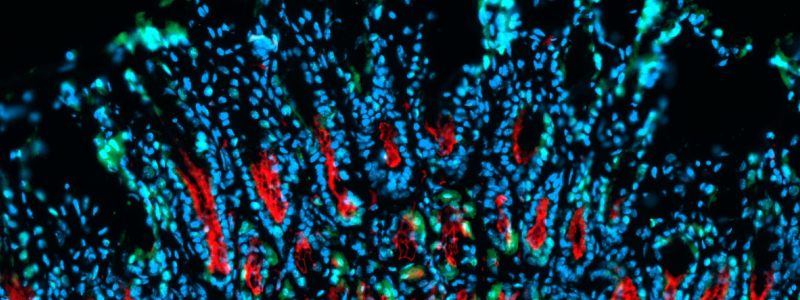Immuno-pharmacology of cancer

Carole Bourquin's main focus since many years is the pharmacological modulation of innate immunity. With her group, she has shown how innate recognition of viral infection modifies responses to TLR and RLR stimulation. These dynamic adaptations to infection may reinforce antiviral immunity and at the same time serve to limit pathological inflammation.
She has also characterized in detail the responses to pharmacological TLR7 stimulation, both on effector cell types such cytotoxic T cells and NK cells, and on immunosuppressive cell types such as regulatory T cells and myeloid-derived suppressor cells. Importantly, she has shown how innate immune activation controls the migration of B and T cells to specialized lymphoid organs such as gut-associated lymphoid tissues. She has further shown how pharmacological TLR7 stimulation impacts the anticancer immune response and controls the migration of effector and regulatory immune cells to the tumor.
A further achievement of Prof. Bourquin's research is the development of drug delivery systems for pharmacological activators of innate immunity, that allow more effective and at the same time safer application of these drugs.
Specific expertise
- Assessment of innate immunity in cellular models (PBMC, dendritic cells), functional assays
- Various in vivo cancer models (spontaneous gastric cancer model), detailed analysis of intratumoral immune infiltration (FACS, immunohistology, transcriptomics)
- CRISPR-Cas on primary immune cells
- Real-time imaging of live cells, e.g. cytotoxicity or proliferation assays (Incucyte)
Selected Publications
Hočevar S, Milošević A, Rodriguez-Lorenzo L, Ackermann-Hirschi L, Mottas I, Petri-Fink A, Rothen-Rutishauser B, Bourquin C*, Clift MJD* (*shared senior authorship) Polymer-coated gold nanospheres do not impair the innate immune function of human B lymphocytes in vitro. ACS Nano, 2019, 13:6790-6800. (JIF 13.9)
Mottas I; Bekdemir A; Cereghetti A; Spagnuolo L; Yang YS; Müller M; Irvine D; Stellacci F*; Bourquin C* (*shared senior authorship). Amphiphilic nanoparticle delivery enhances the anticancer efficacy of a TLR7 ligand via local immune activation. Biomaterials, 2019, 190-191:111-120. (JIF 8.8)
Rapp M, Wintergerst M, Kunz W, Vetter V, Knott M, Lisowski D, Haubner S, Moder S, Thaler R, Eiber S, Meyer B, Röhrle N, Piseddu I, Grassmann S, Layritz P, Kühnemuth B, Stutte S, Bourquin C*, von Andrian U*, Endres S*, Anz D* (*shared senior authorship). CCL22 controls immunity by promoting regulatory T cell communication with dendritic cells in lymph nodes. Journal of Experimental Medicine, 2019, 216:1170-1181. (JIF 10.8)
Anz D, Rapp M, Eiber S, Koelzer VH, Thaler R, Haubner S, Knott M, Nagel S, Golic M, Wiedemann GM, Bauernfeind F, Wurzenberger C, Hornung V, Scholz C, Mayr D, Rothenfusser S, Endres S, Bourquin C. Suppression of Intratumoral CCL22 by Type I Interferon Inhibits Migration of Regulatory T Cells and Blocks Cancer Progression. Cancer Research, 2015, 75:4483-93. (JIF 9.3)
Hotz C, Roetzer LC, Huber T, Sailer A, Oberson A, Treinies M, Heidegger S, Herbst T, Endres S, Bourquin C. TLR and RLR Signaling Are Reprogrammed in Opposite Directions after Detection of Viral Infection. Journal of Immunology, 2015, 195:4387-95. (JIF 5.4)
